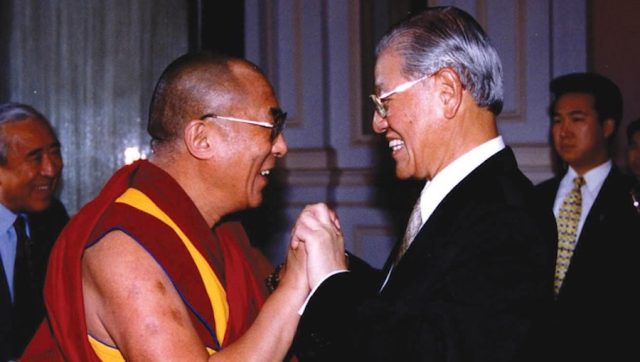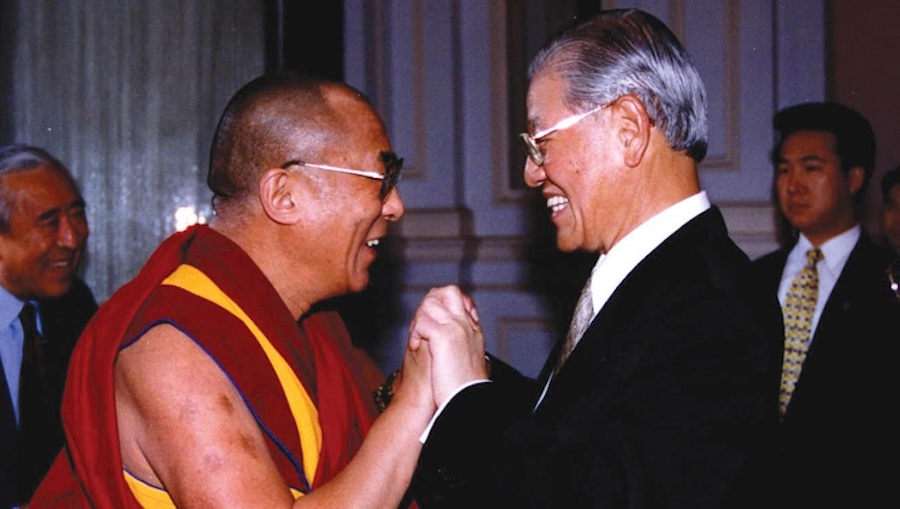By Khedroob Thondup
I first visited Taiwan in 1985, when I was deputed by His Holiness the Dalai Lama to start a dialogue with the Chinese Nationalist Party (KMT).
I spent three days talking to officials, the end result being the signing of an agreement where the Republic of China (ROC) recognized the right to self-determination of Tibetans.
According to official KMT records in Nanking, Tibet never paid taxes to the ROC government.
In 1997, the Dalai Lama made his first ever visit to Taiwan on the invitation of then-president Lee Teng-hui (李登輝). Lee took the bold step of opening Taiwan’s doors to His Holiness. The visit was most successful and changed the attitude of His Holiness toward Taiwanese.
His Holiness asked me what I thought of his visit and I advised him saying that, as this was his first visit ever to a “Han territory,” it was historical, and if he was successful in Taiwan he would be successful in China.
After seeing Taiwan’s robust democracy, His Holiness recognized Taiwanese as a separate entity to Chinese.
Later that year I visited Taipei to start grassroots lobbying for Tibetan issues. On one occasion I met then-Taipei mayor Chen Shui-bian (陳水扁), who was quite upset, as he had not been given an audience with His Holiness during his visit. As mayor, Chen issued an invitation to His Holiness, which His Holiness accepted when Chen was president.
In a breakfast meeting with former American Institute in Taiwan director James Lilley and then-Democratic Progressive Party (DPP) chairman Hsu Hsin-liang (許信良), the latter asked Lilley whether he thought China would ever fire missiles toward Taiwan. Lilley turned toward me and said: “Why don’t we ask our Tibetan friend?” I retorted by giving the example of the Chinese invasion of Tibet in 1950, where they used modern weapons against us Tibetans.
I have always felt the DPP was good in opposition politics, but never had any idea of China’s brutal tactics and how to defend Taiwan.
One issue which I found disturbing was national identity. In the 1990s there were two distinct camps: Mainlanders and local residents. Today this has evolved as young people in Taiwan identify themselves as Taiwanese.
After Typhoon Morakot, which caused widespread death and destruction, His Holiness was invited to Taiwan and the KMT government issued him a visa on condition he did not make any political statements.
President Tsai Ing-wen (蔡英文) in her first term became the only DPP president not to issue a visa to the Dalai Lama upon his request to visit Taiwan.
After 30 years in Taiwan I admire the way democracy has become vibrant, but I wonder whether Taiwanese have the will to stand up to the People’s Republic of China (PRC).
“One country two systems,” which was started in Tibet and failed in Hong Kong, has come and gone. What is now left for the PRC is the use of brute force: They have suppressed Tibet, then Hong Kong and are now using strong-arm tactics on Taiwan.
I believe Taiwanese democracy will survive, but Taiwanese have to stand up for themselves first.
(Views expressed are his own)
The author is a former member of the Tibetan Parliament-in-Exile.













